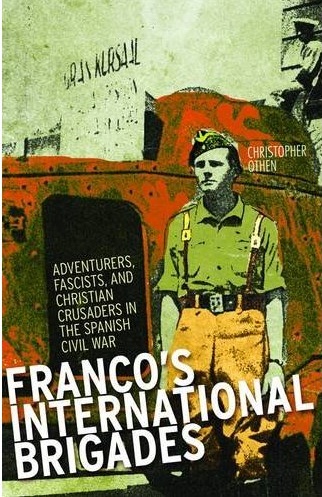Reviewer: Wouter van Dijk
Franco's International Brigades. Adventurers, Fascists, and Christian Crusaders in the Spanish Civil War, Christopher Othen
Columbia University Press/Hurst Publishers, New York, London 2013
ISBN: 978-0-231-70425-0
Paperback, with notes, select bibliography and index
337 pages
$19,80 / £15.99 / €21,99
Franco's foreign helpers
Compared with their Republican counterparts, international volunteers who went to Spain to fight for Franco have received little attention in historiography. With his book Christopher Othen tries to balance the scales some more. Othen holds degrees in linguistics, literature and law and has been working as a journalist, legal representative and language teacher. Strangely enough, he doesn't seem to have a history eductation or any other clear connection with history as an academic subject.
Othen divides his narrative about foreign Nationalist volunteers in two parts. The first deals with the period from 17 July 1936 to 31 March 1937 and is named for general Mola's coup d'etat. The second part deals with the period from 1 April 1937 onwards, and is named after Franco's civil war. The chapters in the two parts are mainly chronologically following each other, telling the stories of the various individuals and bands of volunteers that came from across Europe and further to help the Nationalists in the war. The distinction between 'Mola's coup' and 'Franco's civil war' seems a bit artificial though, because if a coup does'nt succeed in a few days time, it has naturally failed, because the nature of a coup is in it's swift replacing of the former government to which it has been directed. Speaking of a coup that lasts more than eight months thus seems a bit odd. Also when remembering Franco already had been chosen commander in chief of the Nationalist forces by September 21st, 1936, there is no reason looking at him as the leader of the Nationalists only from 1 April 1937.
The chapters in the book are mainly both chronologically and thematically formed, one chapter dealing with volunteer(s) from one particular group or country. As Othen tells us early on in his book, already in the first days of the rebellion it becomes clear the Nationalists did not let principles get in their way when they gladly accepted help in their rising from the Moroccan nationalist movement Al-Islah. Earlier, the Republican government had declined an offer of help by these Moroccans, fearing this would scare France, with which she was engaged in negotiations about war supplies deliveries. In those days Spain and France together ruled in Morocco, dividing it into two separate protectorates. Feeding the nationalist movement in the Spanish part could also spread to the French-held part of the country. Of course Franco never intended to give the Moroccons their independence once he won the war, although the 20.000 who came to fight for him did this because of this promise.
Othen brings together a range of international fighters for fascism, such as the upperclass rich layabout Rupert Belville who joins the ranks of the Falange when he gets enough of the parties, casino's and hotel bars of southern France. He soon leaves again however, when he gets drafted into the execution squads that were doing a busy job behind the Nationalists' lines. Another, more conservative oriented, Nationalist volunteer was Peter Kemp. Educated in Cambridge and joining the Carlist Requetés, who suited him perfectly because of his own archaic political ideas.
Othen reveals a lot of colourful detail on individual foreign volunteers, and it soon becomes apparent that he has a background in literature and language study since his writing style is very entertaining and varied. However, the historical analysis is sometimes lacking, perhaps because of Othen's lack of academic training in this field. For instance, he sees the invention of the non-intervention committee as sprouting from France's wish to deny war supplies to the Spanish Republic, when this solution actual was brought up by the French because of their fear of standing alone in their help of the Republic, with Great Britain disapproving of supporting the Spanish government. Another example is his treatment of the organization and implementation of the International Brigades as a solely Soviet Union invention. The proposal was first made by officials from the Comintern, and despite that there were close ties between the communists of the Comintern and the Soviet Union, it is too much praise for Stalin to state he invented the Brigades by himself. Also, Othen consequently keeps calling Republican soldiers militiamen, even when describing events well after the absorption of the militias by the regular armhy in the course of 1937.
The author did succeed wonderfully though, in disclosing a lot of scarcely known deetails about the various bands of conservatives, fascists and rightwingers who went to Spain in order to assist Franco. The chapter on the fascist-like Romanian legionaries of the Legiunea Arhanghelul Mihail (Legion of the Archangel Michael) is particularly startling. Although most of the stories Othen tells usually contain only a few adventurers or crusaders, these personal tales shed a refreshing light on the subject of Francoist volunteers. Irish religious fanatics, Italian adventurers and Russian exiles all pass by, adding colour to Othen's narrative.
An interesting point made by the author, is when he describes how Franco, after initial enthusiasm for international volunteers, became more reserved towards them once Italy and Germany had decided to supply the Nationalist cause with all man force and supplies that were needed. The Generalissimo tried to cancel his agreement with the Irish fascists under O'Duffy and tried to prevent the White Russian exiles from across Europe to join his forces. He simply did not need them anymore. Also, the chapter on the role of racism at both sides in the war is worth mentioning, for bringing some light to this understudied part of the conflict.
Othen ends with giving an overview of the motives of the various volunteer groups that were treated by him in the course of the book, and describing in a short manner their experiences after Franco's victory. Many afterwards fought in the Second World War, some on the side of the Allies, others joined the Axis. This kind of epilogue is a nice ending of the book.
As said above, Othen writes in an entertaining style and his book is full of intriguing stories about rightwing volunteers and adventurers, and describes their various reasons for joning the war in Spain. However, Othen often fails when he dives into explaining international politics in Europe, simplifying a lot and distorting facts at times. Nevertheless his work provides a wealth of information about Francoist volunteers and can function perfectly as a starting ground for more research on these Nationalist volunteers that historiography tends to forget.
Wouter van Dijk
